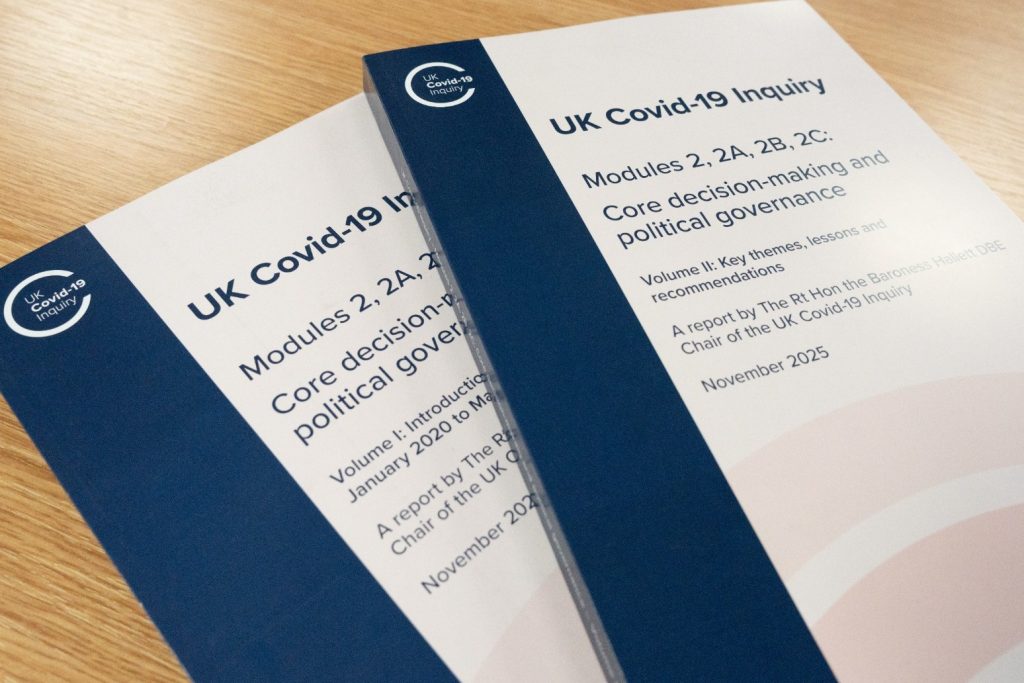Covid Probe Calls For Reform To Help The UK Be Better Prepared For Pandemics
The human and financial cost of the Covid-19 pandemic will be “in vain” unless lessons are learned from the crisis, the chairwoman of the pandemic probe has said.
Baroness Heather Hallett’s report into political decision making during the crisis acknowledges that politicians were faced with “unenviable choices” and says there were “few, if any, easy decisions to make”.
But the report, which totals more than 800 pages, sets out how lives could have been saved and lockdowns may have been avoided if different decisions were taken.
“I can summarise my findings of the response as ‘too little, too late,’” Lady Hallett said in a statement.
“The Inquiry has therefore identified a number of key lessons learned to inform the response to a future pandemic.
“In all, I make 19 key recommendations that I believe will better protect the UK in any future pandemic and improve decision-making in a crisis.”
Some of these recommendations include:
– A tool for the public to be able to see what restrictions apply to them in the event of a future pandemic. This comes after the report highlighted how some restrictions caused “confusion”;
– The report highlights how there was a lack of formal arrangement for who should cover for the Prime Minister in the event of an emergency and highlights how former premier Boris Johnson was admitted to hospital with Covid-19 in April 2020. Lady Hallett calls for contingency arrangements to be put in place for key people including the prime minister and the first ministers of the devolved nations;
– The report says that children “were not always prioritised” during the crisis and Lady Hallett calls for child rights impact assessments to be placed “on a statutory footing”;
– A new framework to identify people at highest risk of disease and most likely to be negatively impacted by a future pandemic response. “The framework should set out specific steps that could be taken to mitigate the risks to these people,” the report adds;
– A call for publication of technical advice on scientific, economic and social matters during a civil emergency;
– A number of recommendations about scientific advisory groups. The report highlights how there was no process in place to ensure that the Government’s Scientific Advisory Group for Emergencies (Sage) “provided sufficient breadth of scientific expertise”. The report also said experts were “recruited through existing networks and professional connections, relying on people who were able to free up time from their normal jobs”;
– Future pandemic preparedness strategies should set out how decision-making will work in a future crisis;
– How representatives of the devolved nations should be able to attend Government emergency committee meetings. The report highlighted a “lack of trust” between then prime minister Mr Johnson and the first ministers of the devolved nations;
– The Government should also make plans for accessible communications, including British Sign Language interpreters in Government press conferences;
– It makes specific recommendations on the ability to scrutinise emergency powers and calls for a review of the Civil Contingencies Act of 2004.
In the forward of the report, Lady Hallett draws on the first report of the inquiry which concluded that the UK was “ill prepared for dealing with a catastrophic emergency, let alone the coronavirus pandemic that actually struck”.
She adds: “Had the UK been better prepared, fewer lives would have been lost, the socio-economic costs would have been substantially reduced and some of the decisions politicians had to take would have been far more straightforward.”
Speaking after the publication of the report, Lady Hallett said: “The Inquiry has identified a number of key lessons learned to inform the response to a future pandemic.
“They must be considered during the development of future pandemic preparedness strategies.
“In all, I make 19 key recommendations that I believe will better safeguard the UK in any future pandemic and improve decision making in a crisis.”
She added: “Unless the lessons are learned and fundamental change is implemented, the human and financial cost and sacrifice of the Covid-19 pandemic will have been in vain.”
Published: by Radio NewsHub

